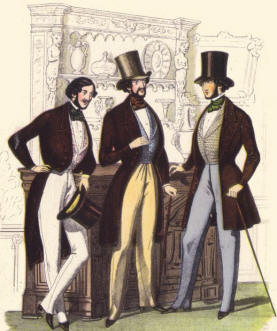Men's Fashions in the 1840s
from The Handbook of Fashion, 1849 edition (first published in 1839)
"Among trivial matters, nothing, perhaps, more often
distinguishes a gentleman from a plebeian, than the wearing of gloves. A
gentleman has worn them so constantly from his earliest years, that he feels
uncomfortably without them in the street, and he never suffers his hands to
be bare for a moment; a vulgar person, on the contrary, finds himself
incommoded by a warmth and confinement to which he is unaccustomed, and even
if, in compliage with usage, he has supplied himself with what he deems
unworthy of the expense, he will do no more than swing them between his
fingers, or wrap them around his thumb. It is not enough that you carry
gloves, you should wear them. It is a very common thing to see young men,
parading upon some place of public promenade, expensively and even genteelly
dressed, having canes, rings, &c.,-but without gloves. The ungloved hand is
the cloven foot of their vulgarity.
In full-dress evening company, white or yellow gloves should
be worn, but should be taken off in eating. But at a small evening party of
thirty or forty persons, which is necessarily a half-dress occasion, it is
more proper to wear dark gloves than white ones.
It is offensive to offer a gloved hand to a person, unless he, too, is
gloved. If two persons meet one another and both have their gloves on, they
should shake hands without removing them; men unfamiliar with the world
often withdraw the glove on such an occasion, not considering that equality
of position is the only thing to be desired. But if one draws off his glove,
it would be the grossest rudeness for the other to retain his. As it is
troublesome to be compelled to unglove, if you, having your glove off,
salute one who has his glove on, you should not offer him your hand. The
ceremony of shaking hands should, like every other that a gentleman
performs, be done with deliberation and composure; if, therefore, there
occur to yourself or the other party, any delay on occasion of this sort,
you should wait without embarrassment or agitation, and quietly offer or
receive the hand wherever it is prepared. In paying a morning visit, have
one glove off, or partly off, in entering; for you may meet some gentleman
of the family, with whom it would be necessary to exchange the hand.

In receiving company in one's own house, one should not be much dressed. A
man should not wear gloves; not only because it is senseless and unmeaning,
seeing that men, unlike women, only wear them abroad, but also because if
any of the company had forgotten that part of his apparel, the gloves of his
host would make him feel awkwardly.
At a morning visit, a frock-coat may be worn, and a cane, which together
with the hat must be taken into the room and retained in the hand. The hour
after which dress becomes indispensable, begins with dinner.
When you lay down your hat in a room, or on a bench in a public place, you
should put the open part downwards, so that the leather which has been
soiled by the hair may not be seen.
Small articles for which there may be use, as a pencil-case, or card-case,
should be carried in the waistcoat pocket. Nothing should be carried in the
pockets of the pantaloons, as it is extremely inelegant to thrust the hand
into them. In company, as little as possible should be borne in pockets of
the coat; indeed, a full-dress coast should be made without pockets…
Seal-rings are, at this day, never worn by people of ton. You see them often
upon the fingers of second or third rate people; but gentlemen have wholly
abandoned their use. Sometimes a plain gold ring is worn by men of
condition, but nothing beyond that.
At a dance or large evening party, a chapeau bras is appropriate and
elegant; but to carry a common hat on such occasions, as is done by some
awkward imitators of fashion, is clumsy and absurd…
You should never present yourself at a large evening party without having
your hair dressed and curled. Nothing so decidedly gives a dressed air to
the figure as well-arranged hair; and without it, the best and most elegant
apparel misses its effect. The chin should also be newly reaped…"
(c) Copyright 2004.
04/22/2006